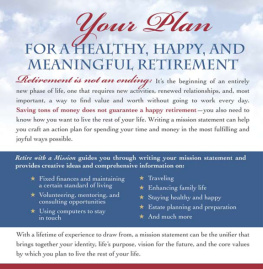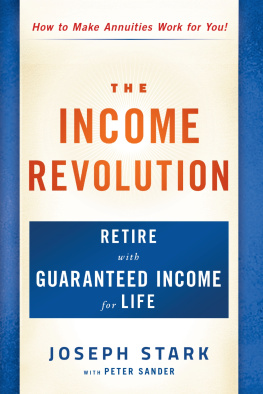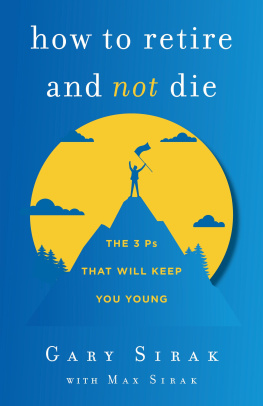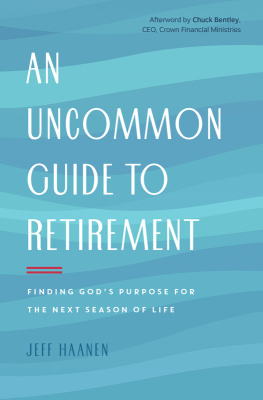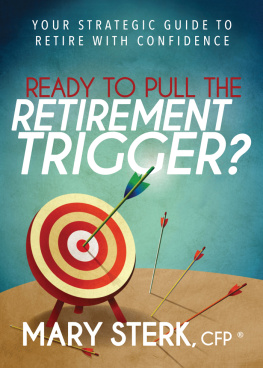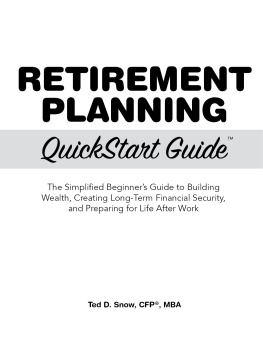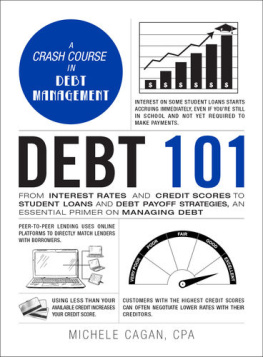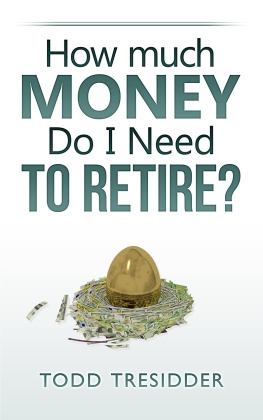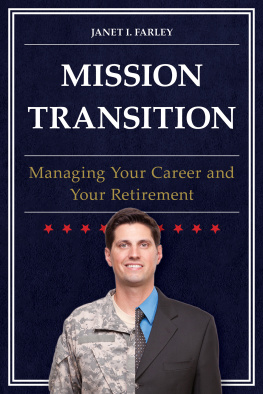The author is indebted to many colleagues and friends for encouragement and creative ideas to improve the manuscript. Dr. Roy Whitman, a professor of psychiatry at the University of Cincinnati College of Medicine, reviewed the psychological content of Section II. Lewis Gatch, an attorney, composed Chapter 12, The Skinny on Estate Planning. I offer special thanks to Colleen Glenn, Dawn Ramirez, and Anne Bowling for their assistance in the editing process.
Introduction
YOUR NEWFOUND FREEDOM
Gainful employment places the clock squarely in the center of your universe. Usually the occupation you have chosen channels your best energies and ideas toward satisfying the goals and objectives of the firm. Customers must be satisfied, bosses placated, and company culture adhered to. Other people gauge your productivity, and the firm defines and shapes your aspirations. A facade of interactive congeniality, cooperation, and teamwork is necessary to perform the job.
During the working years the routines of the workplace are generally given precedence over all other activities. Home, family life, and enjoyable pastimes ordinarily take a back seat to work commitments. Consequently, work often siphons your most creative energies and carries a high opportunity cost that prohibits other forms of self-expression. Employment begs the question: Who needs these hassles that place you on a treadmill, in a box, and under the gun of performance?
Despite the pervasive publicity about stress management, most individuals dont fully appreciate how stressful their jobs were until they retire and look back. And this observation spans all gender, ethnic, and employment differences. Indeed, retrospect leads many to realize that they were living that well-known life of quiet desperation.
Retirement is an incredibly good time to enjoy life. The two foremost luxuries of retirement are less stress and an adaptable schedule. To phrase it differently, in retirement you have the empowerment to ignore the metronome of the clock and the discretion to control your schedule. Further, to put it in childhood terms, you can generally do what you want to do, when you want to do it.
You have the freedom to let your personal interests take center stage. Your activities are no longer measured by profitability, but by self-satisfaction. You can pick and choose with whom you wish to associate. The previous overriding competition between work and play ceases when you cross the threshold of retirement.
Freedom from the rigors of gainful employment makes time for satisfying pastimes. Retirement facilitates a focus on a healthy lifestyle with regular exercise and ample rest. The windfall of time and energy can be redirected to spouses, grandchildren, hobbies, travel, sports, reading, gardening, and so on. Retirement offers a surefire prescription to achieve stress-free living.
However, there is no rulebook, no standards, and no explicit training manual for retirement. Without exception, it takes time and patience to reengineer the business behaviors and expectations of a lifetime into a new contexta new mission. And this new mission is highlighted by self-direction, self-sufficiency, and self-satisfaction that make for a breathtaking journey in retirement.
THE END OF AN ERA
There are seventy-three million baby-boomerswith a net worth of about $25 trillionreaching retirement age over the next decade. This diffusion of wealth has fostered a realistic goal of early retirement. Indeed, a recent AARP survey revealed that when a random group was asked at what age they wanted to stop working entirely for pay, the average age was 59.7 years. And when asked at what age they expected to stop working for pay, the answer was 63.7 years.
Today, a retirement party just a few years after the sentinel fiftieth birthday is commonplace. To compound this demographic shift to early retirement, life expectancy for both men and women is dramatically increasing the period of highly functional life beyond the retirement age. On average, today a sixty-five-year-old can expect to live sixteen to twenty more years and an eighty-five-year-old seven more years.
This poses a genuine paradox: While advancements in healthcare and healthy lifestyles improve quality and length of life, at the same time social trends embrace the early escape from the rigors of full-time employment. If this trend continues and is exacerbated by a declining numbers of younger workers, who is going to pay the Social Security and pension benefits for this large group of retired persons to live on? Estimates vary, but the Office of the Actuary gives an unfunded pension liability figure for America of about $10.5 trillion, and experts from the American Enterprise Institute estimate unfunded liabilities for Medicare at about $36.6 trillion. These are sums that vastly exceed the current GDP of about $13 trillion. At some point in time, our elected representatives must bite the bullet and craft the painful, necessary solutions.
Whatever the financial underpinnings, your retirement will not be a static end point for demobilization, but rather an opportunity for new beginnings. Retirement leverages the rewards of a productive career to focus on a new rainbow of possibilities. This is especially true since you come equipped with a lifetime of experience and preferences, both excellent drawing tools that can help you create a new blueprint for this liberated stage of life.

